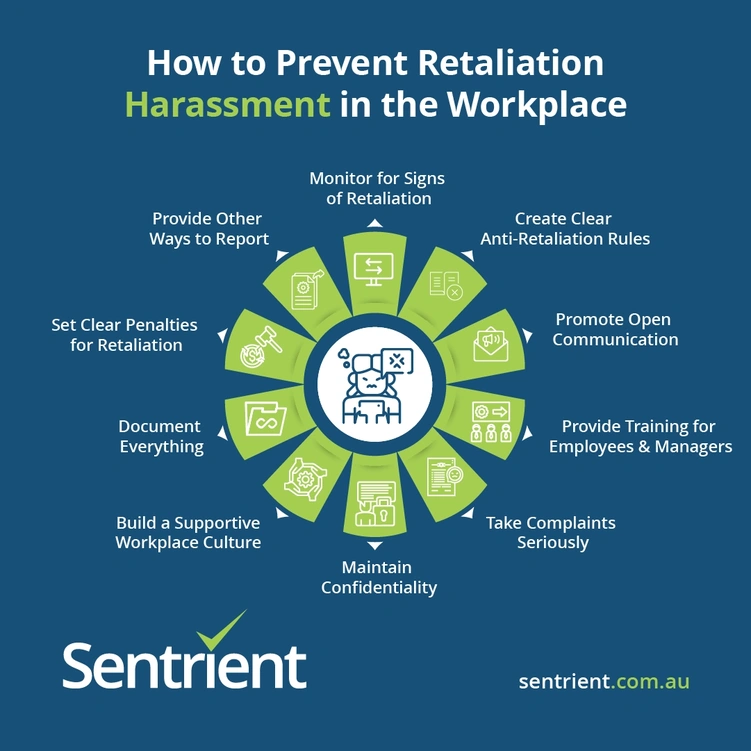Have you ever voiced a concern at work, only to feel like you suddenly have a target on your back? One day you’re part of the team, and the next, you’re getting the “cold shoulder” or “randomly” lose your best shifts.
In Australia, we value a “fair go.” However, unfortunately, retaliation and harassment in the workplace occur more frequently than they should. If you’ve suffered negative consequences after making a complaint, you aren’t just dealing with a “grumpy boss”; you might be experiencing illegal retaliation.
Let’s break down what this looks like, the logic behind it, and the facts you need to know.
What Exactly is Retaliation Harassment?
In simple terms, retaliation harassment is when an employer or colleague punishes an employee for engaging in a “protected activity.”
A protected activity includes things like:
- Reporting sexual harassment.
- Filing a claim for unfair dismissal.
- Inquiring about unpaid wages.
- Participating in an internal investigation.
According to the Fair Work Commission, it is illegal for an employer to take “adverse action” against you because you exercised a workplace right.
5 Common Examples of Retaliation After Reporting Harassment

Retaliation isn’t always a dramatic “You’re fired!” moment. Often, it’s a slow burn designed to make you quit. Here are the most common ways workplace harassment retaliation shows up:
1. The Sudden “Performance Issue”
You’ve had glowing reviews for three years. Suddenly, two weeks after you made a retaliation for reporting a workplace harassment claim, your manager puts you on a Performance Improvement Plan (PIP). If the “faults” are vague or newly invented, it’s a massive red flag.
2. The “Social Freeze”
This is the “high school” version of workplace bullying. Managers might stop inviting you to key meetings, or colleagues might suddenly stop eating lunch with you because they were told you’re “Trouble.” This isolation is a classic form of harassment and retaliation.
3. The Roster From Hell
In industries such as retail or hospitality, retaliation can often result in financial loss. If your boss moves you from the lucrative Saturday shift to the quiet Tuesday morning slot or cuts your hours entirely after you speak up, that is likely retaliation for a claim of harassment.
4. The “Ghost” Promotion
You were the top candidate for the next step. Then, you reported a senior staff member for inappropriate behaviour. Suddenly, the promotion goes to “Dave,” who has half your experience and spends most of his day watching cricket highlights.
5. Increased Supervision (Micromanagement)
If your supervisor starts tracking your bathroom breaks or breathing down your neck about every comma in an email only after a complaint, they are likely looking for an excuse to push you out.
The Legal Reality: Discrimination, Harassment, and Retaliation
Under the Fair Work Act 2009, these actions fall under “General Protections.” You have the right to work in an environment free from discrimination, harassment, and retaliation.
The Australian Human Rights Commission notes that retaliation can be even more damaging than the original incident, as it discourages others from speaking up in the future. It creates a “culture of silence” that protects bullies and hurts productivity.
Logic Check: If an employer’s first instinct after a report is to punish the whistleblower rather than fix the problem, they aren’t just being “tough”; they are exposing the company to massive legal liability.
How to Prove Retaliation Harassment in the Workplace
Proving intent can be tricky, but it is not impossible. If you feel you are experiencing retaliation harassment, do these three things:
- Keep a Paper Trail: Document every unusual interaction, change in shift, or snarky comment. Include dates, times, and witnesses.
- Compare the “Before and After”: Highlight the contrast in your work life before the report and after the report.
- Check the Policy: Most Australian companies have a “Whistleblower” or “Grievance” policy. Check if they are adhering to their own rules.
Summary: Your Rights Matter
No one should have to choose between their dignity and their paycheck. Retaliation after reporting harassment is a serious breach of employment law. If you feel you are being squeezed out, you don’t have to “take it” or “toughen up.”
Australia has some of the strongest workplace protections in the world. Whether it’s through the Fair Work Commission or a legal representative, help is available.
Related Blogs:





